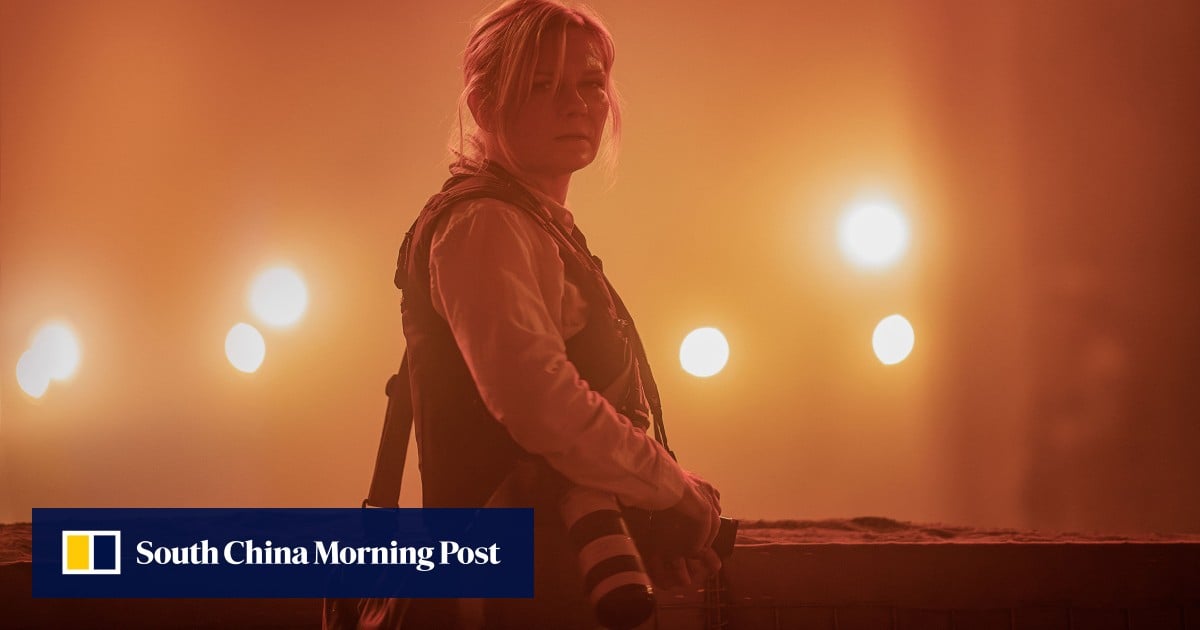“That was pretty deafening back then,” Garland says. “So in a way, it’s slightly past zeitgeist. It’s actually oppressive.”
Civil War is an ominous attempt to turn widely held American anxieties into a violent, unsettling big-screen reality.
Yet it is something far more oblique than its matter-of-fact title. The film, which Garland wrote and directed, is not mapped directly against today’s polarisation.
Alex Garland’s Ex Machina is a man-vs-machine tale that sides with the machines
Alex Garland’s Ex Machina is a man-vs-machine tale that sides with the machines
In a war that has already ravaged the country, California and Texas have joined forces against a fascist president (Nick Offerman) who has seized a third term and disbanded the FBI.
A band of journalists (Kirsten Dunst, Cailee Spaeny, Wagner Moura) makes its way towards Washington.
Much of the film’s disquiet comes from seeing visceral encounters of war – bombings, firefights and executions – on contemporary American soil (to take advantage of tax breaks, Civil War was mostly shot in the US state of Georgia).
For everyone who has in recent years wondered “How bad can it get?” – a concern some polls have shown is held by as much as 40 per cent of the population – here is a sobering answer.
“When things collapse, the speed at which they collapse tends to surprise people – including people like intelligence officers whose job is to watch and predict when these things will happen,” Garland says. “Things are always in a slightly more dangerous state than they might appear.”
The rapidity with which society can disintegrate has long fascinated Garland, the 53-year-old British-born filmmaker who emerged with the screenplay to the zombie apocalypse thriller 28 Days Later.
There are always people attempting to make these films. The question is whether they’ve been given the support to make them
Western democracies, he says, can lean too much on their sense of exceptionalism. To him, Civil War is not an act of cynicism. It is a warning shot.
“The consequences of it are so serious that to not take the threat seriously would, itself, be another kind of insanity,” says Garland. “It would just be complacent.”
While there have been online murmurings questioning the appropriateness of the timing for Civil War, controversy has not yet clung to it. That might be owed to Garland’s approach.
Unique New York video rental shop recalled in documentary Kim’s Video
Unique New York video rental shop recalled in documentary Kim’s Video
There are few direct allusions to the deepest fissures of American politics today in the film. Joining Texas and California together removes any “blue state” vs “red state” dichotomy. Neither race nor income inequality appear as issues of division. The president’s political party is unspecified.
“I had never read a script like this,” said Dunst at the film’s premiere at the South by Southwest film festival. “And I had never seen a film like this.”
Civil War, set in a near future, instead plays out with more subtle connections to today’s fractured politics and cultural splits.
Filipino director on his new esports film, horror, and hardships
Filipino director on his new esports film, horror, and hardships
Jesse Plemons plays a heinous militant who interrogates the main characters, asking them: “What kind of American are you?” Though it is never seen, Charlottesville, Virginia – the site of a 2017 white supremacist rally – is referred to as a battle front.
Asked about that choice, Garland replies: “The film is just reporting”.
But the director acknowledges finding the right balance was a challenge.

“Yes, it was a [expletive] delicate balance,” Garland says. “We thought about it, we discussed it, we talked about what was appropriate.
“Look, the plan is to make a compelling and engaging film, and the product of the compelling and engaging film is a conversation. So the questions are: How do you make sure that you’re not dismantling a conversation in the first part of that equation?”
That led to Garland placing journalists in the foreground of Civil War.
As much as anything, Garland’s film is about the central role reporters play in capturing critical events in lethal conditions. Unbiased reporting, Garland says, has been eroded. In Civil War, it is literally under attack.
CGI pioneer, Avatar director James Cameron, says ‘pump the brakes’ on AI
CGI pioneer, Avatar director James Cameron, says ‘pump the brakes’ on AI
“What I wanted to do was present journalists as reporters,” Garland says. “They may be conflicted, they may be compromised as individuals, but they’re holding on to an idea of journalism.”
Costing US$50 million (HK$390 million) to make, Civil War is the most expensive film yet from A24. The indie studio is pushing to expand its reach beyond arthouse cinemas and expand the reach of its critically acclaimed films. Civil War is, ironically, a bid to draw wider audiences.
“A lot of the boldness is not actually mine,” Garland says. “I think it belongs to A24. You would find there are always people attempting to make these films. The question is whether they’ve been given the support to make them.”
Civil War is just depicting a possibility, the director stresses, not making a prediction. Still, months after he finished writing it, Garland watched an insurrection play out on live television when a mob stormed the United States Capitol Building on January 6, 2021. At the time, his thoughts were not on his script.
“What I had was this incredibly intense feeling that this is a disgrace,” Garland says. “Later, as time went by, some of that anger fed into the project.
“Not so much in terms of rewriting scenes or dialogue or anything. But more to do with an internal sense of motivation. Something that felt more distant felt less distant.”
